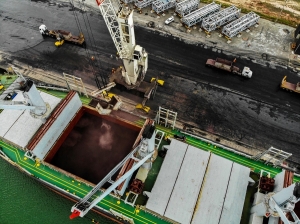


(Posted on 17/05/23)
Vale has concluded the shipment of its first cargo of iron ore briquettes to be tested in a blast furnace outside of Brazil. The briquette is an innovative product that can reduce CO2 emissions from steelmaking by up to 10%. The industrial test will take place in early May at a client's facility in Europe. 8,000 tons of the product have been shipped from the Multi-load Terminal of the Port of Açu, in the state of Rio de Janeiro, Brazil, heading for the Port of Rotterdam in the Netherlands.
The briquette's behaviour during the trans-oceanic transportation, estimated to last 20 days, and its performance in the steel mill's blast furnace will be tested. In Brazil, 70,000 tons of briquette have already been industrially tested in six different blast furnaces, totalizing 126 days of use.
During the tests carried out in Brazil, he briquette succeeded in attending the process requests, allowing the production and operational parameters of the blast furnace to be maintained. The same is expected to happen in the tests in Europe.
"This is another important milestone on our path to providing low carbon emission solutions for the global steel industry. With the industrial tests we can gain the confidence of strategic partners who will be the leaders in the use of briquette in the coming years," said Rogério Nogueira, director of Product and Business Development at Vale.
For Port of Açu, the unprecedented movement is an important step to position the port enterprise as an important player in the decarbonization process of the steel sector. "This type of cargo reinforces the ambition of the Port of Açu to be the port of energy transition in Brazil. Furthermore, the port's strategy includes accelerating the decarbonization of the steel and chemical industries' value chains, sectors that are critical to reduce CO2 emissions coming from the so-called hard to abate," said José Firmo, CEO of Port of Açu.
The briquette is produced from the briquetting of iron ore fines and a technological solution of agglomerants that allows achieving high mechanical strength at low temperatures. The product can replace sinter, pellets and lump in blast furnaces and pellets in direct reduction furnaces, reducing the emission of pollutants and greenhouse gases when compared to traditional processes of iron ore agglomeration (pelletization and sintering). The substitution of the sintering stage is what allows the potential reduction of carbon emissions by up to 10%.
The cargo shipped was produced at a demonstration plant in the state of São Paulo. Vale is building two briquette plants at its Tubarão Unit in Vitória, in the state of Espírito Santo, with capacity for 6mtpy. Start-up of the first plant is planned for the end of the first half of the year.
In addition, memoranda of understanding have already been signed with more than 30 clients to study the implementation of decarbonization solutions, including the construction of briquette plants at the facilities of some clients.
Announced by Vale in 2021, briquette contributes to achieving the company's commitment to reduce 15% of scope 3 net emissions by 2035. The company also seeks to reduce its absolute scope 1 and 2 emissions by 33% by 2030 and achieve neutrality by 2050, in line with the Paris Agreement ambition to limit global warming below 2°C by the end of the century.
The National Grain and Feed Association (NGFA) has applauded Senator Deb. Fischer’s (R-Neb.) reintroduction... Read more
Anglo American plc and Teck Resources Limited have received regulatory approval from the Government... Read more
The Rhodes Ridge Joint Venture has approved a $191 million (A$294 million) (Rio Tinto share $96 million... Read more
Trafigura Group Pte Ltd, a global leader in the commodities industry, has announced its financial results... Read more
Rio Tinto has successfully produced the first copper from the Johnson Camp mine in Arizona using its... Read more
The American Soybean Association’s World Initiative for Soy in Human Health programme and the... Read more
Karlka Nyiyaparli Aboriginal Corporation (KNAC) Registered Native Title Body Corporate and Rio Tinto... Read more
OCI Global, a leading global producer and distributor of nitrogen products has announced that it has... Read more
In December 2024, SSAB was granted a permit by the Land and Environment Court at Umeå District... Read more
The President of the Republic of Guinea has joined project partners WCS1, Baowu, Chinalco and Rio Tinto... Read more